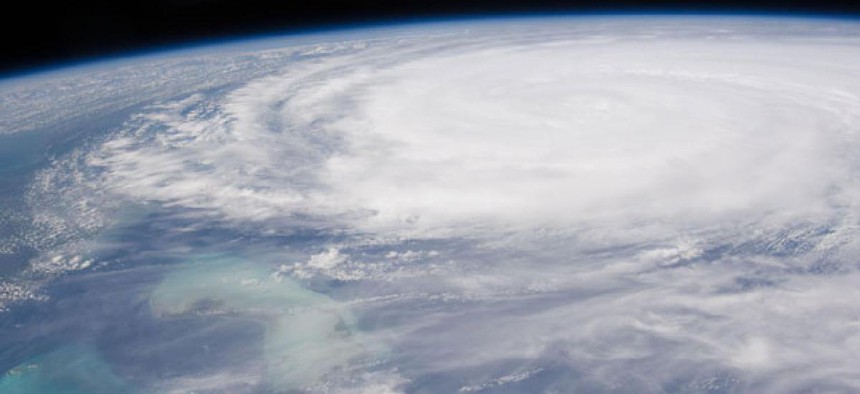
Hurricane Irene threatened Florida in 2011. NASA
Tropical threat emerges for next week's GOP convention
Spokesman confident in ability to handle any situation.
As tens of thousands prepare to converge on Tampa for next week's Republican National Convention, organizers may be forced to brace for an unwelcome visitor -- what soon could be Tropical Storm or Hurricane Isaac.
Planners for the quadrennial convention have long been preparing for such an eventuality that could disrupt their program, but some at the Republican National Committee dismissed the likelihood of a storm when they chose the coastal Tampa Bay area two years ago.
The current threat centers around a tropical wave over the Atlantic Ocean. That system was about 1,100 miles east of the Caribbean Sea as of 8 a.m. Eastern time on Monday, moving westward at 20 to 25 mph.
The National Hurricane Center in Miami says the disturbance now known as "Invest 94L" has an 80 percent chance of becoming a tropical cyclone in the next 48 hours. The Hurricane Center defines a tropical cyclone as "a rotating, organized system of clouds and thunderstorms that originates over tropical or subtropical waters and has a closed low-level circulation."
Storms with maximum sustained winds of 38 mph or weaker are classified as tropical depressions; those with winds between 39 and 73 miles an hour are called tropical storms. A hurricane has maximum sustained winds of at least 74 mph, with higher gusts.
Tropical cyclones are very difficult to predict more than 72 hours in advance -- both in terms of location and intensity -- so forecasts a week out are unreliable. Meteorologists use computer simulations to help guide their forecasts and identify threats in advance to aid preparedness efforts. Some of these models indicate the storm could threaten Florida as early as Sunday, the day before the start of the Tampa convention. Other computer simulations show the storm moving into the Caribbean south of Puerto Rico and Hispaniola, while others indicate that it could move north and potentially threaten other areas of the U.S. east coast.
There are also some indications that any development of the system could be limited this week by dry air and wind shear at the upper levels of the atmosphere. But the storm is traveling through the Atlantic just a few weeks before the peak of hurricane season in early September. The water that helps fuel tropical systems is at its warmest in late summer, and the final days of August have produced some of the most destructive hurricanes ever to strike the U.S., including Andrew in 1992, Katrina in 2005, and Irene last year.
A convention spokesman declined to comment on whether planners were following any specific threats but said they were confident in their ability to handle any situation, along with the Secret Service and state and federal emergency-management authorities.
"We have a special set of contingency plans in place," said James Davis, communications director for the convention, pointing to ar "strong information center" that could be used to communicate with attendees in the event of an emergency, adding that "their safety is an utmost priority."
Shortly after the RNC awarded the convention to Tampa, Holly Hughes, a committee member from Michigan and chair of the site-selection committee, told National Journal that her group spoke with a panel of weather experts during the decision-making process. Those experts, she said, told her that it had been "nearly 100 years" since a hurricane has struck Tampa directly.
"Weather is always a concern," Hughes said at the time, "but we don't think we're going to get hit with a hurricane."






